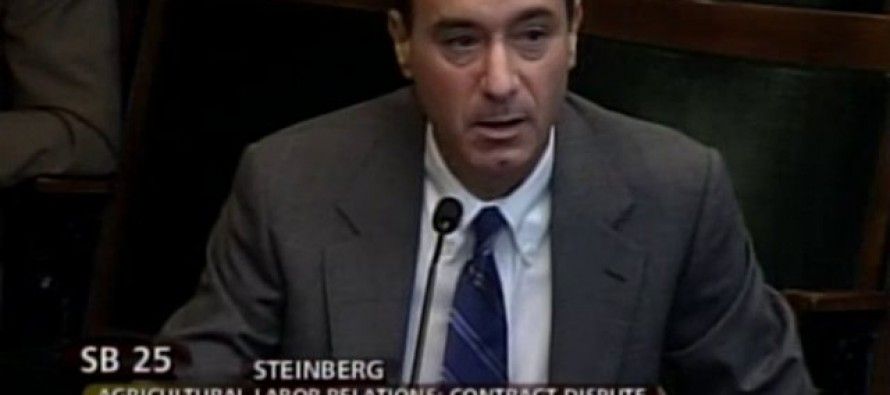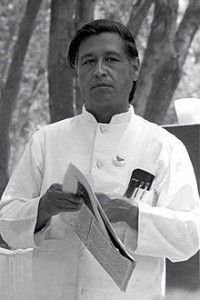UFW pushes bill granting it special privileges

By Katy Grimes
Without SB 25, the United Farm Workers union is going to need to make tough reforms to survive. By state Senate President Pro Tem Darrell Steinberg, D-Sacramento, the bill would grant the UFW advantages that no other union in California has, such as forcing employers into repeated mediation. And this is a very union-friendly state.
Opponents say California’s 1975 Agricultural Labor Relations Act, signed into law by Gov. Jerry Brown during his first stint as governor, remains adequate. It granted broad new rights to laborers and has stood the test of time.
In a way, the UFW is a victim of its own success. The years of suffering and protesting under legendary founder Cesar Chavez, who now has a state holiday honoring him on March 31, paid off with the ALRA. It provides many of the worker protections that previously needed to be negotiated in union contracts.
To succeed, Chavez needed only the ALRA, not SB 25.
Chavez died in 1993. And as often happens after a charismatic leader departs, the organization he animated struggles to remain relevant. According to the UFW’s Form LM-2 Labor Organization Annual Report filed with the U.S. Department of Labor on April 10, 2013, as of Dec. 31, 2012 the union had only 4,443 members.
According to a January 2012 article in The Nation magazine, “Cesar Chavez and the Farmworkers: What Went Wrong?,” the union boasted “50,000 members at the end of the 1970s.” So it has declined by more than 90 percent. By contrast, today the California Teachers Association lists 325,000 members.
The article in The Nation, a liberal magazine, quoted Frank Bardacke, the author of a recent book on Chavez and the UFW. “The UFW had no locals,” he said of the union’s problems. “That was a tremendous mistake. There’s no substitute for face to face debate, people having direct control over their local union affairs. That’s the way you build strength.”
SB 25 detailss
Sponsored by the UAW itself, SB 25 would let the union continue its complacency while artificially boosting its numbers. It passed the state Senate on May 6. But last week the bill was killed by the Assembly Labor and Employment Committee because it could not get enough votes to pass.
Committee Chairman Assemblyman Roger Hernandez, D-West Covina, allowed reconsideration of the bill. It will be heard Wednesday, June 26, in that committee.
SB 25 proposes to make dramatic changes to the mandatory mediation process added in 2002 as amendments to the ALRA. Among other things, it would:
* Force privately owned and family farms to fire farm workers who fail or refuse to pay union dues for jobs they’ve held for years.
* Remove the one-time limit on mandatory mediation when there is a labor dispute. Doing so would allow unlimited demands for mediation that would have to be met. Here’s the specific wording in SB 25, “Deletes the requirement of existing law that, for labor organizations certified after January 1, 2003, the mandatory mediation process would only apply for an initial request to bargain.” (Underline in original.)
“This bill would close legal loopholes and stop cynical games growers play to deny their farm workers the life-changing protections of union contract [sic],” said the UFW on its Website.
Opponents of SB 25 say the perpetual mediation would be a weapon so powerful that there would no longer be a need to negotiate with the UFW, only capitulate.
Democratic doubts
Many Democrats from agricultural districts are beginning to have doubts about a bill that likely would kill jobs in there areas. Unlike prosperous Sacramento and Silicon Valley, California’s farm belt only now is beginning to recover from the Great Recession.
These Democratic doubts have alarmed the UFW. “Democratic members of that committee—Assemblymembers Chris Holden and Luis Alejo—chose not to vote for SB 25!” the UFW exclaimed on its Website. “Assemblymember Holden has said he will vote for it next week when the bill will be heard again on June 26, but Assemblymember Alejo still has not responded.” Holden represents Pasadena.
Alejo did not vote on the bill, which caused quite an uproar in Salinas, his home turf. And as I reported Monday, Alejo has clashed with the union over attempts by its own workers to negotiate better labor contracts.
Alejo told the Salinas Californian he had concerns about SB 25 and had reached out to the union prior to the hearing. “We had a meeting set up for Tuesday [June 18, prior to the bill vote] and [the UFW] canceled,” Alejo said. Shortly after the vote, the UFW was protesting at Alejo’s Capitol office.
Affect on farmers
“Once a contract is imposed on our workers, it will double or even triple the size of the UFW’s current membership,” Dan Gerawan told me; he’s the president of Gerawan Farming, a family-owned business in Reedley which employs more than 5,000 farm workers. “So, more than half of the UFW’s membership will never have been given the opportunity to express whether they even want the UFW to represent them.”
He said the timing of SB 25 is not a coincidence. If his workers are forcibly organized under SB 25, the union’s current membership of 4,443 would more than double, to more than 9,443.
“And with perpetual mediation being a possibility under SB 25, my employees may never have that opportunity to vote, yet will have to pay 3 percent of their wages [as dues] or lose their jobs.”
Gerawan said the UFW tried to organize his workers 23 years ago. After only one bargaining session, the UFW abandoned the workers and the process.
Gerawan said that recent amendments to SB 25 have not changed the essential part that the UFW never has to bargain in good faith, or even bargain at all, before it makes the demand to negotiate. “The amendment does nothing to make it so workers have an opportunity to ratify or reject a contract, despite the fact the contracts will require them to pay dues or lose their jobs,” Gerawan said.
“This is just plain wrong,” he testified recently before the Assembly Labor and Employment Committee. “We aren’t talking about a few dozen workers. We’re talking about thousands of the industry’s highest paid, happiest employees having a union forced on them without ever getting the chance to vote.”
Gerawan said his farming company pays high wages and benefits, including retirement, vacation pay and even the tuition for the workers’ children at the local Catholic St. La Salle School. (YouTube of Sr. Lucy, the principal, below.)
Related Articles
The Polite Sacramento Tea Party
The tax day Tea Party held at the state capitol in Sacramento was a bustling event, attended by colorful, patriotic
Michal Bloomberg’s candor beats Jerry Brown’s candor — by a mile
Jack Dean of the invaluable pensiontsunami.com website sent me a Politicker story about departing New York City Mayor Michael Bloomberg’s
More guns, less crime
July 23, 2012 By Katy Grimes The mainstream news reports about the Aurora, Colorado theater shooting on Thursday night is





